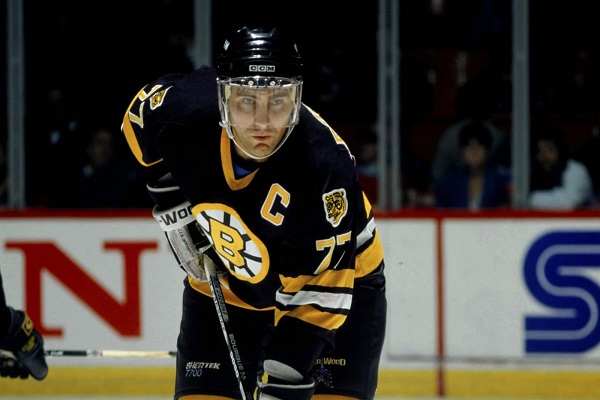
By Andrew Taverna | Follow me on Twitter @andrewtaverna
Raymond Jean Bourque, born in Saint-Laurent, Quebec, Canada, on December 28th, 1960, is best known for being one of the best defensemen ever to play the game of hockey and a 21-year Boston Bruin. That’ll be where we spend most of our time for this article, but I’d like to give this retired hockey player, now expert restaurateur, a quick shoutout. If you haven’t been to Tresca yet in the North End of Boston, you’re missing out. Anyway, Bourque’s 21-year career in Boston was something we haven’t seen since.
Early Playing Years
Bourque started his professional player in the QMJHL (Quebec Major Junior Hockey League) after being drafted by the Trois-Rivières Draveurs in the third round. Bourque would get traded to Sorel for Benoît Gosselin halfway through his rookie season. Bourque spent the remainder of his time in the QMJHL with Sorel and Verdun, where he would be named the league’s best defenseman in ’78 and 79′. During the 1979 NHL Entry Draft, Ray Bourque was selected by then-GM Harry Sinden in the eighth overall spot. It would not take Bourque long to impact the Boston organization significantly.
Boston Bruins
Ray Bourque entered the league like a man on fire. In his inaugural season, Bourque put up 65-points and cemented himself as a top-tier defenseman in the entire league. During that 79-80 season, he would win the Calder Memorial Trophy as Rookie of the Year and earn a First Team All-Star selection. His freshman campaign did not turn out to be a fluke either; Bourque would continue to be the top-tier defenseman the Bruins had been looking for and in 1985 was named co-captain of the Boston Bruins along with Bruins legend Rick Middleton. Middleton and Bourque would split the C until the 88′ season when Middleton announced his retirement from hockey. Bourque would then take sole possession of the captaincy for the remainder of his time in Boston.
Bourque’s strength, resilience, and offensive abilities have often set him apart from others when talking about the best defensemen ever to play the game. The Bruins without Bourque in the lineup would look like an entirely different team at times. Bourque would win the Norris Trophy for the league’s top-defenseman five times and would bring the Bruins to the Stanley Cup FInal twice against the Edmonton Oilers in 1988 and 1990. Ulimtiley, the Bruins fell short in both of those battles, losing the cup and sending Bourque home without the one thing he had been chasing. Bourque was often the enemy of the NHLPA because he refused to negotiate top-dollar contracts with the Bruins. Not only was he a tremendous hockey player, but he was a fan favorite because of his willingness to sacrifice for his team in Boston. Falling short of winning the cup would lead Bourque to request a trade and leave the Bruins to head for Colorado.
Winning the Cup (In Colorado)
The Bruins were in what many will remember could only be fondly remembered as a “slide” as Bourque neared the end of his career. For that reason, Bourque would end up requesting a trade to give himself one last chance at winning a cup. I remember being devastated as a young kid with tears filling my eyes when my father explained the importance of winning a Stanley Cup and why it would mean so much to Bourque. It might not have eased my pain much as a Bruins fan, but I will tell you, for the next year and a half, I became one of the biggest Avalanche fans you’ve ever met.
Bourque’s request would be granted, and Dave Andrechuk and Bourque would be headed to Colorado in exchange for Brian Rolston, Martin Grenier, Samuel Pahlsson, and a first-round pick (Martin Samuelsson). Bourque would spend that half-season with Colorado helping push the team to the conference finals, where they’d fall short to the Dallas Stars. The following season would take a different turn, though, as the Avalanche would advance all the way to the Stanley Cup Final, where Bourque would score a game-winning goal against the Devils to help his team ultimately win. Avalanche Captain Joe Sakic would break tradition and hand the Cup to Ray Bourque to take the customary first sake holding it high above his head. Sitting here now, I still get a lump in my throat when I think about watching that moment as a kid.
Back To Boston
On June 12th, 2001, only three days after the Avalanche finished winning the best trophy in the world, Bourque would show up in Boston with the cup in tow. In a rally of 20,000 people, Bourque would celebrate his major accomplishment in the place he called home, Massachusettes. Bourque would ultimately retire from hockey with 410 goals, 1,169 assists, totaling 1,579 points, and holding more records than anyone can count on their fingers and toes. In 2004, Bourque was inducted into the Hockey Hall of Fame during his first season of eligibility. He is one of only nine players to have his number retired by more than one organization.
77 has made a significant contribution to the game of hockey, but as mentioned earlier in this article, his contribution to our community and our state has been far more outstanding. If you’ve made it this far down the article, you know that Bourque had a massive impact on my love for hockey. You can see here the one time I’ve been fortunate enough to meet him.
I didn’t have the forethought or the brainpower while standing in star-struck paralysis to ask him for his autograph, but this photo of my father and I hangs above my desk in my office, and I think about that moment frequently when watching the B’s take the ice. Beyond his personal impact and his restaurant mentioned at the beginning of this article, Bourque has done one more massively helpful thing for the Massachusetts community: founding the Bourque Family Foundation. This foundation has done numerous charity events in the area, benefiting countless organizations since its inception in the summer of 2017. If you can afford to contribute, we’d highly recommend you do so to help celebrate this absolute legends birthday.
Happy Birthday, Ray!


My idol growing up. He made me a Bruin fan in the cup against Gretzky. I went from the Oilers to the Bruins. The way he skated. The precision shooting accuracy .
The passion and leadership this man carried himself. He hit guys like a freight train from Quebec.